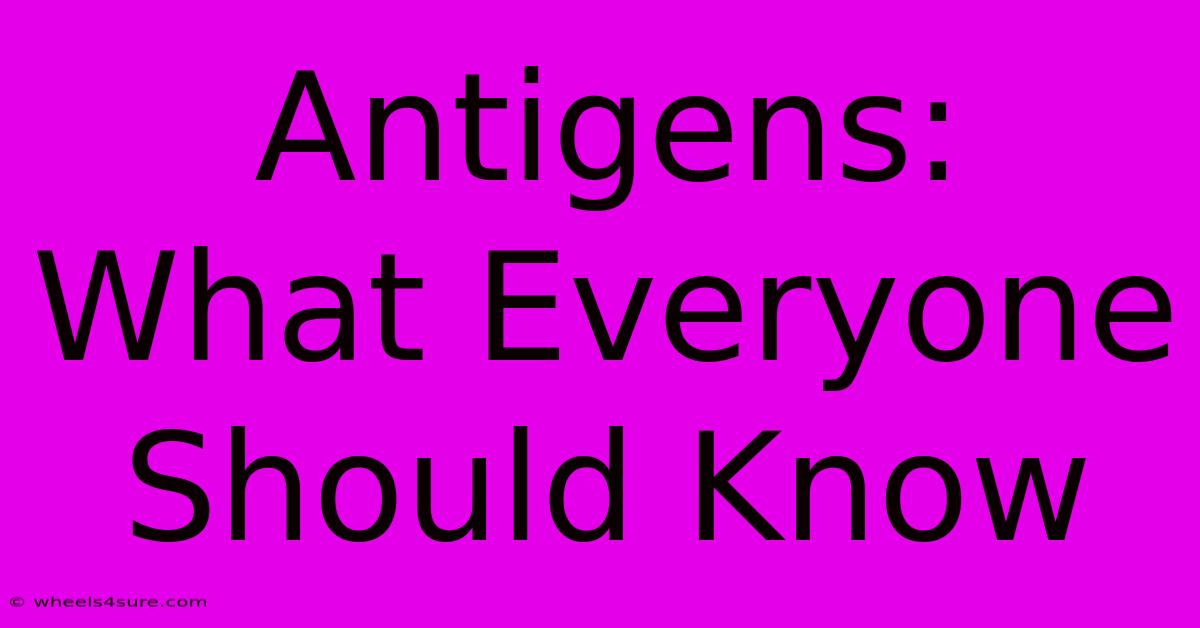Antigens: What Everyone Should Know

Table of Contents
Antigens: What Everyone Should Know
Antigens are substances that trigger an immune response in the body. Understanding antigens is crucial for comprehending how our immune system works, how vaccines function, and why allergies and autoimmune diseases occur. This comprehensive guide will delve into the world of antigens, explaining their nature, function, and significance in health and disease.
What are Antigens?
Simply put, an antigen is anything that can cause your immune system to produce antibodies. These antibodies are specialized proteins that bind to antigens, marking them for destruction and neutralizing their harmful effects. Antigens can be a wide variety of substances, including:
- Proteins: These are the most common type of antigen. Examples include proteins found on the surface of bacteria, viruses, fungi, and parasites.
- Polysaccharides: These complex carbohydrates are also frequently found on the surface of pathogens (disease-causing organisms).
- Lipids: Certain fats and lipids can act as antigens, particularly when combined with other molecules.
- Nucleic acids: DNA and RNA can also trigger an immune response under specific circumstances.
How Antigens Work: The Immune Response
When an antigen enters the body, it's recognized by specialized immune cells called lymphocytes. These cells then initiate a cascade of events:
- Antigen Presentation: Immune cells, like macrophages and dendritic cells, engulf the antigen and present fragments of it on their surface to T lymphocytes.
- T Cell Activation: Specific T cells, with receptors that recognize the presented antigen fragment, become activated.
- B Cell Activation: Activated T cells, along with other signals, help activate B lymphocytes.
- Antibody Production: Activated B cells differentiate into plasma cells, which produce large quantities of antibodies specific to the antigen.
- Antigen Elimination: These antibodies bind to the antigen, marking it for destruction by other immune cells or neutralizing its harmful effects.
Types of Antigens: A Closer Look
Antigens can be categorized in several ways:
- Exogenous Antigens: These originate from outside the body, such as bacteria, viruses, pollen, or toxins.
- Endogenous Antigens: These are produced within the body, often as a result of viral infection or cancerous cell activity.
- Autoantigens: These are self-antigens, meaning they are normally found within the body. In autoimmune diseases, the immune system mistakenly attacks these autoantigens.
Antigens and Disease
Antigens play a central role in numerous diseases:
- Infectious Diseases: The antigens on the surface of pathogens are the primary targets of the immune system's response during infections.
- Allergies: Allergic reactions occur when the immune system overreacts to harmless antigens, like pollen or pet dander.
- Autoimmune Diseases: Autoimmune diseases, such as rheumatoid arthritis and lupus, result from the immune system attacking the body's own tissues and cells (autoantigens).
- Cancer: Cancer cells often express unique antigens that can be targeted by the immune system. Immunotherapy harnesses this principle to fight cancer.
The Importance of Antigens in Vaccines
Vaccines work by introducing weakened or inactive forms of antigens from pathogens into the body. This triggers an immune response, creating memory B and T cells that provide long-lasting protection against future infections with the same pathogen. This is a key principle for building immunity.
Understanding Antigens: A Key to Health
Understanding antigens is vital for appreciating the complexities of our immune system and the mechanisms behind various diseases. Further research continues to illuminate the intricacies of antigen-immune interactions, paving the way for advancements in vaccines, therapies for autoimmune diseases, and cancer treatments. This knowledge empowers individuals to make informed decisions about their health and seek appropriate medical care when needed.

Thank you for visiting our website wich cover about Antigens: What Everyone Should Know. We hope the information provided has been useful to you. Feel free to contact us if you have any questions or need further assistance. See you next time and dont miss to bookmark.
Featured Posts
-
Ravindra Jadejas Age A Triumph Over Time
Apr 04, 2025
-
Ricciardo From Aussie Grit To Global Fortune
Apr 04, 2025
-
How Much Money Does Lando Norris Actually Make
Apr 04, 2025
-
Shakeel Mohamed The Influence Of His Age On His Decisions
Apr 04, 2025
-
How Rich Is Glynn Keeling Really
Apr 04, 2025
